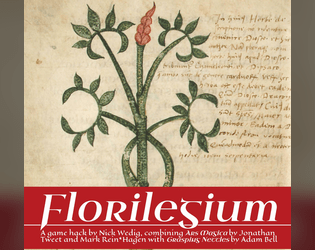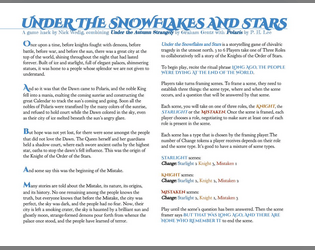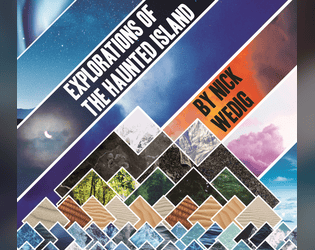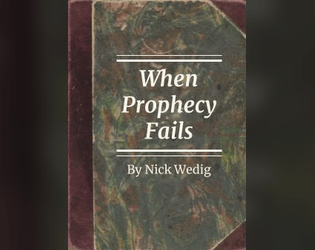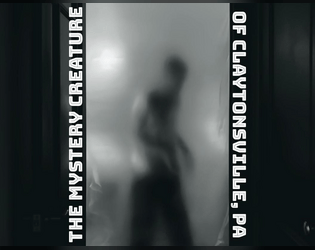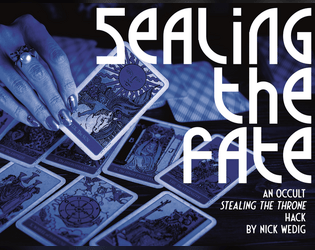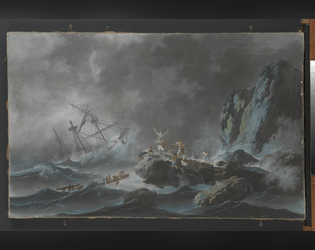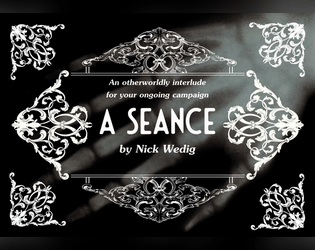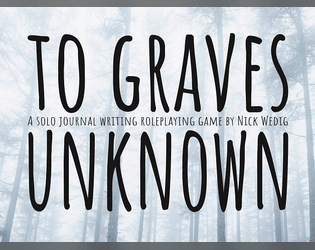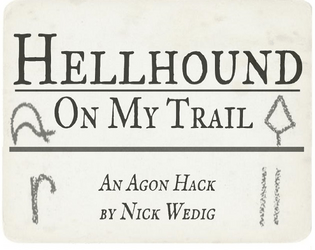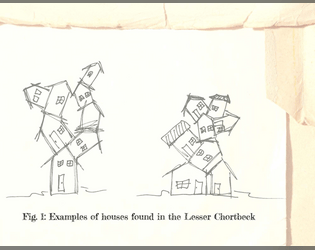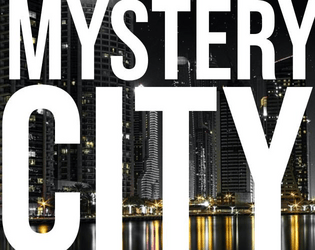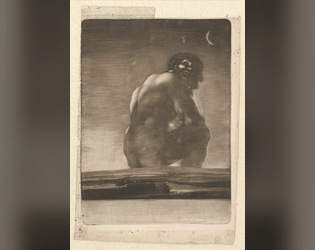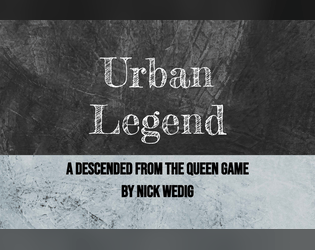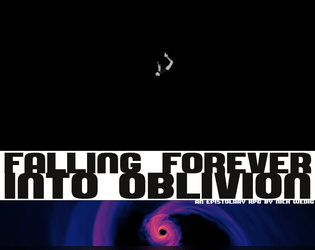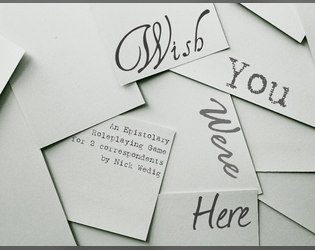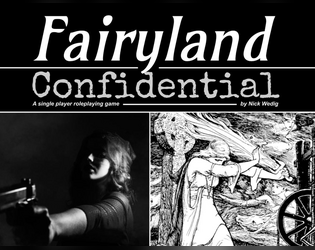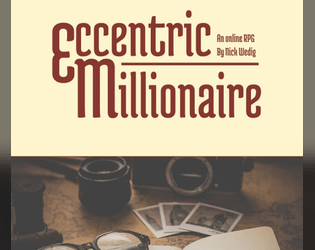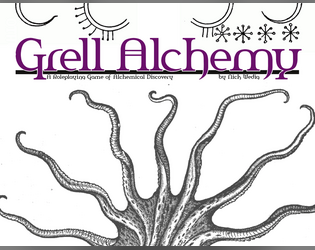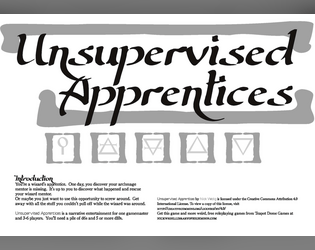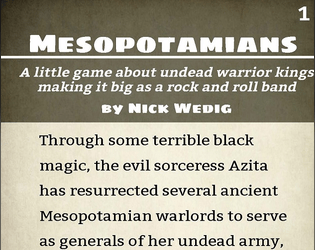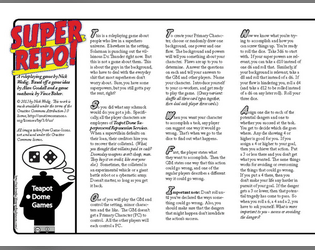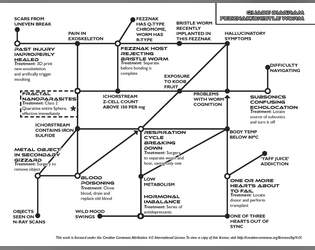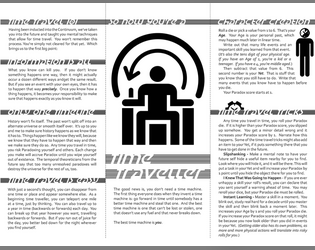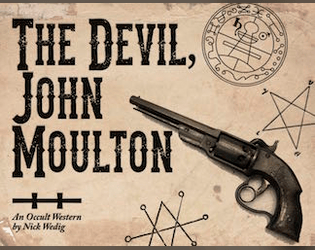Excellent! I'm glad you had a good time playing!
nickwedig
Creator of
Recent community posts
The procedure for that isn't explicitly mechanized. It's up to the players to enact it (using scene framing questions and other tools to guide the story that direction).
The line about "it's every knight's immutable destiny" is important, though: this is the end every player should be playing toward having happen, and it's the responsibility of every player to see that it happens. That player buy-in is really key. If they don't want to see a Knight's tragic downfall, they should probably play another game.
The main difference between scene types is the number of Change tokens each role gets. This will influence the story and how it progresses, as each role gets varying levels of narrative authority.
For example questions, I think a good scene framing question will point the story in an interesting direction but not be so constrained that there's only one answer. A good question is something like "Why does Sir Alphard, last of his line, betray his oath that he gave to his mother on her deathbed?" This gives us a clear direction to play toward (breaking the oath) but a lot of flexibility in how that happens. (We may have a lot of flexibility if this oath has never been established in the fiction before, and we have to define that oath as well as break it.)
The overall story is one of beautiful tragedy and the downfall of the Knights, so anything that builds int hat direction would be good: "What makes the demon so appealing or tempting to the Knight?" or "How is the last great work of the glass sculptors of Polaris finally destroyed?" or "Upon the knight return from their long exile in the wilderness, how do they find the city has changed?"
To a big extent, these questions are up to the players, so that they can guide the story in directions they are interested in it going. (It probably also would help to read the original game Polaris to capture the tone and feel of the setting. Then try to imagine scenes and actions from that game, and use the scene framing questions to help move the game in those directions.)
We played this last night and everyone had a very good time. We created a really interesting town on an alien planet built into the walls of a canyon (because the environment up outside the canyon was dangerous and inhospitable). In the time between Then and Now, a stonemason union led a communist revolution and overthrew the old government. Both the Remained characters had complicated feelings about what they did during the revolution, while the Returning characters had to find a new place within this changed society.
This game did everything I wanted, of telling a emotionally moving story through drawing maps and of making us think about the passage of time. It's really great.
I'd be very much in support of you translating the game into Italian. (I made the game Creative Commons licensed specifically to allow people to make their own versions, including translations.)
If you want to publish it somewhere online, that would be great. Or the Italian files could be included on the itch page for the game, as the French files are. Or both. Whatever works for you.
If you need any of the files I used in creation, you can email me at nickwedig@yahoo.com and I'll give you access to whatever I have.
We played a fun game of A Very Small Life on the Mountainside last night. I had a very nice time playing.
Our first adventurer was a teenager who'd pulled a sword from a stone and was destined to become king. We convinced him to abandon the monarchy instead.
My tiny villager draped some cloth over his abandoned crown and turned it into a yurt.
If I send you the game can you help me get it added to the site? Or you could just download the file and add it or something.
Or just let me know which language I should select for an English language game. Then I could add the game myself. There are English games on the site, but there doesn't seem to be an English language option when I go to create a game?
Were you aware of the previously existing game that already uses that title? https://en.m.wikipedia.org/wiki/Rune_(role-playing_game)
Having two games with the same name might cause some confusion.
You're absolutely allowed to. As long as you give some credit, so that users know who wrote the text, then I'm fine with you copying and pasting chunks. If you post vast swathes of the game text, then make sure you include the Creative Commons license and credit that are found at the end of the document. I'm not going to sue any human being over this game, though.
I don't think it was ever added. I emailed and never got a reply. Then I sort of forgot about it.
I tried to add it myself, but there isn't an option to add an English language game to the site (the dropdown has German, Spanish, French, Francais and what looks like Chinese or Japanese. Not sure how French and Francais are different, but neither is correct.
The EM has primary responsibility for this narration. But in practice, either the EM or the treasure hunter can describe things. Just as when you're playing other RPGs, sometimes the GM describes what happens when a PC attacks a goblin, sometimes the player does. Probably different groups will find different ways that they think are comfortable: some favoring the EM as storyteller, some the other players, some treating this as purely a guessing game and not an RPG at all, so having very few fictionalized details. I think that all should be fine, so long as everyone's on the same page.
I'm leaning toward working on "Back on the Flail Snail Farm", a laid-back pastoral game about raising giant snails like cattle. It'll have some deckbuilding elements and a focus on people's emotional states. We'll see how well that works out.
I might make something else weird instead, though, Who knows.


